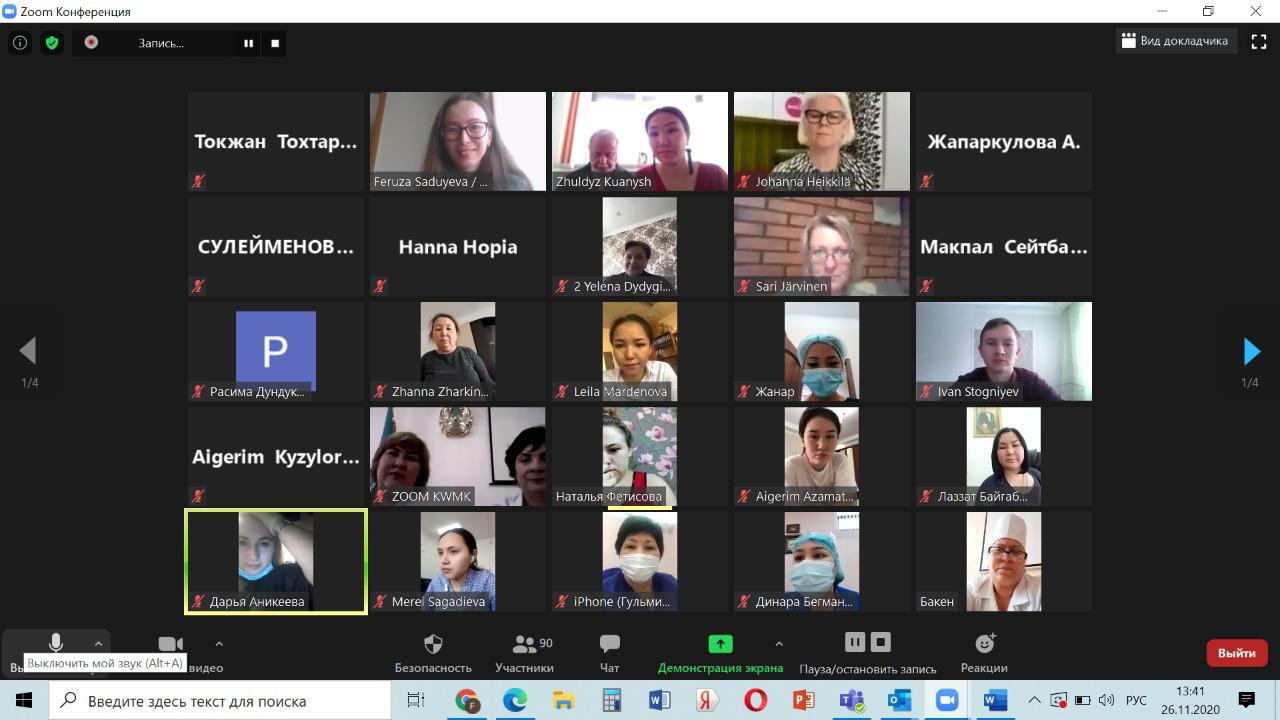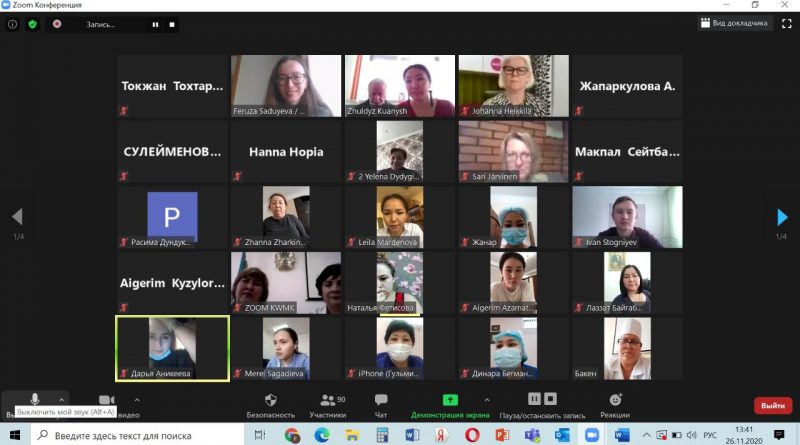Current nursing research topics in Kazakhstan: some critical thoughts
Authors:
Johanna Heikkilä, PhD, Senior advisor, JAMK University of Applied Sciences, Finland
Sari Järvinen, PhD, Specialist, JAMK University of Applied Sciences, Finland
Zhuldyz Kuanysh, Public relation specialist, Karaganda Medical University, Kazakhstan

Nurses are the main workforce of health care. Nursing research is required to improve the quality of care and patient outcomes as well as to provide evidence-based patient care and education. In addition, the new generation of nurse leaders are expected to provide evidence to justify the changes in clinical care. Hence, the development and utilization of research knowledge in nursing practice is necessary also in Kazakhstan. It is essential for the quality of nursing research that the research topics are current and that they are raised from problems in practical nursing. Therefore, the collaboration between the clinical practice and educational institutions is crucial. The role of educational institutions is to give added value to the research by exploring the international scientific literature to chart what is already known and to ensure the high quality of research methodology. (Chan et al 2010, Segrott et al 2006, Tingen 2009.)
To date, nursing research in Kazakhstan has been mainly based on master's theses. It should be noted that not all medical universities recruit students for the master's level. At the moment, in the universities of Kazakhstan, about 60 studies on various nursing topics are in development at the bachelor's and master's levels and three newly enrolled PhD students are just starting their research.
In support of promoting and developing nursing research, Karaganda Medical University and JAMK University of Applied Sciences organized a mini conference "Promoting innovation and research in nursing" on November 26, where participants were able to share their planned research as well as results. The aim of this event was to encourage discussion between educational institutions and practical health care and to promote research in nursing. There were 126 participants in the mini conference, out of which the majority from higher medical colleges (46), medical universities (36), and clinical practice. The participants were Master and PhD students, students of academic and applied bachelor, as well as nurses and teachers.
Altogether 19 abstracts were submitted to the mini conference and seven were accepted for presentation. Most of the researchers were master students and teachers from four out of six medical universities that have master level nursing education in Kazakhstan. In addition, there were abstracts prepared by master graduates in nursing and PhD in Nursing science students. Two abstracts were prepared by teachers from higher medical colleges and one by nurses from clinical practice.
The field of science represented by the abstracts was mostly nursing (68 %; n=13), however almost one third were from the field of public health (26 %; n=5) and medicine (n=1). Mostly, the abstracts were descriptive justifications or background information for future research with limited peer-reviewed references. There were four abstracts on empirical studies and two which claimed to be literature reviews. The two abstracts that stated literature review as their method did not describe the protocol nor the type of the literature review in enough detail.
When analyzing the topic areas and research purposes in comparison to recommendations set for the most urgent nursing research topics (referred later in italics) in Kazakhstan (Heikkilä & Hopia 2019), it can be noted that there were abstracts concerning research targeted to stroke and oncology nursing, which had been recognized as one of the most urgent topics. Several abstracts were concerning the “nurse’s role”, which is very understandable as Kazakhstan is currently modernizing nursing education and there are new job positions such as extended practice nurse and new educational levels such as PhD in Nursing Science. These abstracts can be regarded as examples of the priority area of professional development. As these abstracts were typically from some specific clinical area, they could also be included to the priority area of clinical nursing research. There were also abstracts on each of the following topics: nursing education, ICT and eHealth in nursing, nurses’ well-being, and quality improvement in nursing.
However, there were no abstracts on the area of critical care nursing and emergency nursing, palliative nursing, and heart failure nursing care. Furthermore, what was interesting is that the abstracts classified as nursing science did not address the topic area health promotion and disease prevention regardless of it being one of the high priorities in the strategy Densaulyk (ref). Issues of vaccination, use of tobacco products, obesity and health literacy were addressed in abstracts from the epidemiological and public health perspective without yet realizing the added value that nurses and nursing interventions could have to healthy lifestyle. Moreover, these topics could have been approached from the point of view of patient education, which was also a missing topic area.
As a conclusion, it can be stated that at the moment there is a growing interest and enthusiasm towards acquiring information and conducting nursing research in medical universities, higher medical colleges as well as in clinical practice. As a summary of the topics of the presented abstracts, it is notable that research on the role of nurses and the importance of nursing in clinical practice is growing. Many of the recommended topics are under consideration of individual researchers. It seems that there is an increasing motivation in Kazakhstan to develop high-quality and evidence-based health care and to create new models for organizing nursing services through research. More opportunities to share planned and ongoing nursing research between educational institutions and clinical practice are needed.
References:
Chan, R. Gardner, G., Wester, J. & Geary, A. 2010. Building research capacity in the nursing workforce: the design and evaluation of the nurse researcher role. Australian Journal of Advanced Nursing 27, 4, 62-69.
Heikkilä, J. & Hopia, H. 2019. Report on recommendations to Medical Universities for creation of nursing research agenda. WP2.3 Establish HEI research program and networking in nursing. Available at: https://www.theseus.fi/handle/10024/334632
Jeremy Segrott, J., McIvor, M., & Green, B. 2006 Challenges and strategies in developing nursing research capacity: A review of the literature. International Journal of Nursing Studies 43, 637-651.
State program for the development of health care of the Republic of Kazakhstan "Densaulyk" for 2016-2020 http://ezdrav.kz/files/densaulyk_2016-2020.pdf
Tingen, M., Burnett, A., Murchison, R., & Zhu, H. 2009. The Importance of Nursing Research. Journaö of Nursing Education 48 (39, 167-170.


